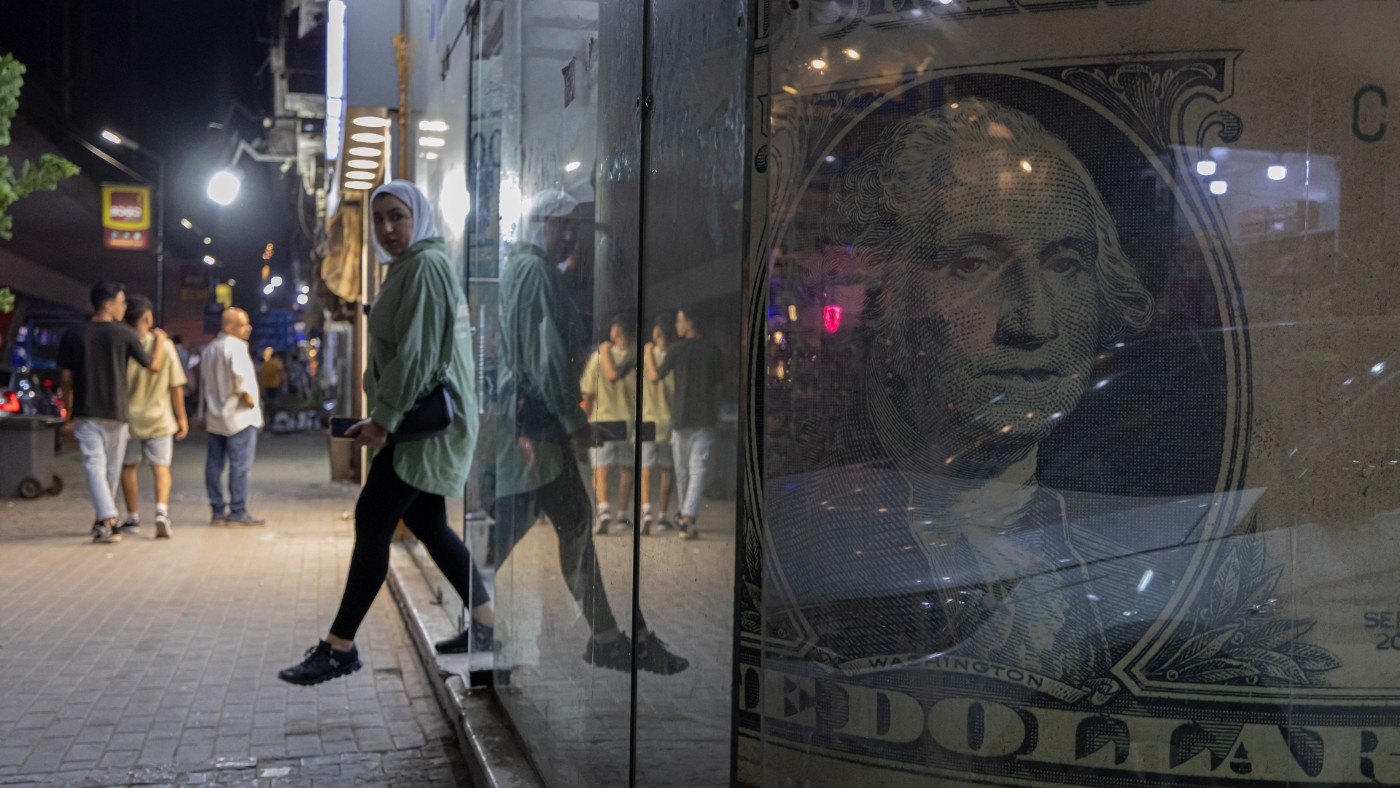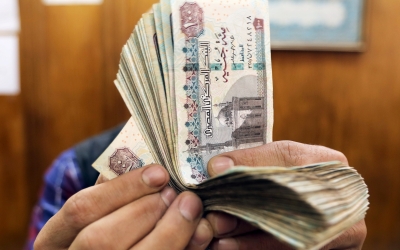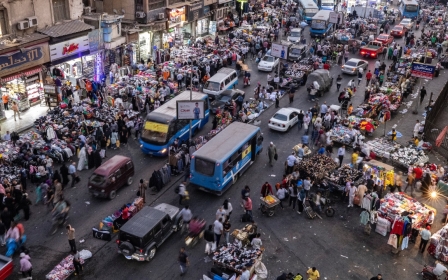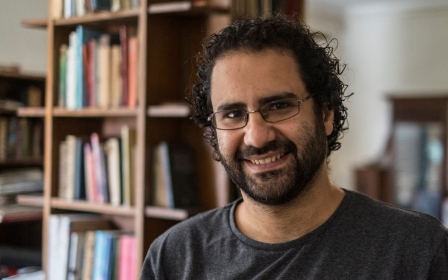Egypt's banks offer unprecedented saving schemes as pound plunges to record low

Two of Egypt's largest state-run banks issued saving certificates with unprecedentedly high interest rates on Wednesday, as the country's currency plunged to a record low and national monetary authorities continued to wrestle runaway inflation while trying to create demand for the Egyptian pound.
The National Bank of Egypt and Banque Misr issued saving certificates - federally insured savings accounts with a fixed dividend rate and a fixed date of maturity - with an annual interest rate of 25 percent and a monthly interest rate of 22.5 percent on Wednesday, the highest in Egyptian banking history.
'I will certainly buy the new certificate because its yield is really tempting'
- Osama Abbas, Egyptian accountant
The new certificates came after the Egyptian pound dropped six percent to 26.4 on the US dollar, the biggest fall since the Central Bank of Egypt (CBE) devalued the currency in October in an effort to clinch a loan deal with the International Monetary Fund (IMF).
The CBE is striving to convince people to trade dollars for the Egyptian pound, which has lost much of its value since Russia invaded Ukraine. Inflation is now running at 21 percent.
“The new certificates will hopefully convince ordinary people to sell their dollars to get the pounds necessary for the purchase of the new certificates,” Mohamed Abdel Hamid, a member of the Egyptian parliament’s economic affairs committee, told Middle East Eye.
New MEE newsletter: Jerusalem Dispatch
Sign up to get the latest insights and analysis on Israel-Palestine, alongside Turkey Unpacked and other MEE newsletters
“Some people stock up on foreign currencies as they do with food,” he said.
The impact of war
Egypt has been hit hard by the war in Ukraine.
The ongoing conflict has hurt important sectors of the economy, particularly tourism, which employs over 10 percent of the North African country’s workforce of 27 million and accounts for 20 percent of Egypt’s GDP.
With a population of over 100 million, Egypt has been paying more for the imports it depends on since the war began. This is particularly true of food, wheat and other cereals and legumes.
'We are badly in need of investments, the only way to create jobs'
- Mohamed Abdel Hamid, Egyptian MP
Apart from causing the flight of billions of dollars in foreign assets, the war has put pressure on Egypt’s foreign currency reserves and on the Egyptian pound.
With banks failing to make the dollars necessary for import operations available, importers fished around for these dollars outside the banking system in order to release a backlog of imported goods at the nations’ ports. This returned, for the first time since 2016, the foreign currency black market to centre stage.
Parallel market traders bought the dollars from members of the public for at least ten pounds more than the banks, exacerbating black market practices and depriving the banks of the dollars needed for import operations.
This use of the parallel market also contributed to the rise of commodity prices in the local market, as most of these commodities come from outside Egypt.
Economists hope that the new saving certificates will create demand for the Egyptian pound and consequently raise the exchange rate of the pound against foreign currencies.
“A rising demand for the pound will reduce demand for US dollars and consequently eradicate the foreign currency parallel market,” Khaled al-Shafie, head of Egyptian think tank the Capital Centre for Economic Studies, told MEE.
The suffering of millions
Growing commodity prices have caused suffering to tens of millions of people and forced authorities to increase funding for the national food rationing system, in a bid to prevent a political and security backlash from the price hikes.
Egypt had a $3bn loan from the International Monetary Fund approved in December to cover its food import needs, maintain its structural reforms and prop up the pound against foreign currencies.
The CBE has also taken a series of measures to contain the effects of the war in Ukraine on the national currency, as well as the inflation rate.
These moves include a series of interest rate hikes and a set of national currency devaluations and limits to imports - including by forcing importers to present letters of credit for their imported shipments.
Some of these measures have backfired, especially after the CBE failed to make the dollars necessary for import operations available, which caused parallel market activities to flourish further.
“The banks pin their hopes on the new saving schemes to redress all these problems by reining in people's purchasing abilities, reducing demand for the dollars and creating demand for the Egyptian pound,” independent economist Abdel Nabi Abdel Mutaleb told MEE.
“I expect the banks to raise the interest rate of US dollar saving certificates in the coming period as well.”
Local banks have raised the interest rate on US dollar saving certificates to over five percent, up from 2.5 percent, in the hope of convincing people to bring their dollars into the banking system.
Investment and occupation
Ordinary people are swarming the banks to buy the new saving certificates, investing billions of Egyptian pounds in them.
Bank officials encourage moneyed Egyptians to hurry so as to make the most of the high yields on the new certificates, noting that they will be available only for a limited time.
People on the streets, meanwhile, are eager to save and enjoy these high returns, expressing hope that these returns will cushion them against inflation and protect their savings.
“I will certainly buy the new certificate because its yield is really tempting,” Osama Abbas, a 54-year-old accountant, told MEE. Abbas, who worked in Saudi Arabia for 20 years, is back in Egypt ready to invest his life's savings in the new certificates.
“The fact is that I cannot start any projects, because I have no experience in business whatsoever,” he said.
This is exactly why observers express fears that the new saving schemes will tempt ordinary people, including members of the business community, to save rather than invest.
There is ongoing debate among Egyptians about investment and about how the government can guarantee annual returns of 25 percent, not to mention the idea that people will simply put their money in banks and then do nothing else.
Egypt needs to create close to a million jobs every year for its graduates and those entering the job market.
Economists have called, meanwhile, for banks to offer financing for investment projects in order to offset the effects of high interest rates on job creation and market activity.
“We are badly in need of investments, the only way to create jobs,” Abdel Hamid, the MP, said. “We need to encourage industrial activities and other activities so that we can absorb the unending flow of people into the job market.”
Middle East Eye delivers independent and unrivalled coverage and analysis of the Middle East, North Africa and beyond. To learn more about republishing this content and the associated fees, please fill out this form. More about MEE can be found here.






